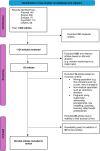A systematic scoping review of mentor training in medical education between 2000 and 2024
- PMID: 40707917
- PMCID: PMC12291282
- DOI: 10.1186/s12909-025-07353-x
A systematic scoping review of mentor training in medical education between 2000 and 2024
Abstract
Background: Effective mentoring in medical education facilitates professional development amongst mentees and mentors, improves patient care and outcomes, as well as advances the reputation of the host organisation. Much of this success is guided, assessed and overseen by the mentor. Yet, mentor training remains inconsistent, poorly supported and often inadequately evaluated. Acknowledging mentor training as an essential aspect of mentoring programs, we propose a review to map current features and approaches to mentor training with the hopes of boosting the effective design of a proposed mentoring program.
Methods: PubMed, Scopus, Embase, PsycINFO and CINAHL database searches were conducted for articles published between 1st January 2000 and 31st March 2024 on mentor training programs in medical education. This systematic scoping review was directed by a PRISMA-guided Systematic Evidence Based Approach (SSR in SEBA).
Results: A total of 1124 abstracts were reviewed, 63 full-text articles were appraised and 69 articles were included. Five key domains were identified: 1) mentor qualities, 2) training structure, 3) content, 4) outcomes, and 5) obstacles.
Conclusion: This SSR in SEBA reiterates the critical role of mentor training and introduces evidence of its impact on the professional identity formation (PIF) of prospective mentors. It also highlights that more programs are employing longitudinal mentoring processes to guide the inculcation of desired mentoring characteristics amongst prospective mentors. These efforts to nurture the PIF of the prospective mentor-to better shape their future mentee's PIF-is novel and requires careful study.
Keywords: Medical schools; Medicine; Mentee; Mentor; Mentor training; Mentoring; Professional identity formation.
© 2025. The Author(s).
Conflict of interest statement
Declarations. Ethics approval and consent to participate: Not applicable. Consent for publication: Not applicable. Competing interests: The authors declare no competing interests.
Figures
Similar articles
-
The Impact of Mentoring on Academic Career Success in Surgical Subspecialties: A Systematic Review.J Surg Educ. 2024 Dec;81(12):103292. doi: 10.1016/j.jsurg.2024.09.011. Epub 2024 Oct 22. J Surg Educ. 2024. PMID: 39442364
-
The effectiveness of providing training and ongoing support to foster cultural humility in volunteers serving as mentors to youth of color: a mixed-methods study protocol.BMC Public Health. 2025 Jan 24;25(1):294. doi: 10.1186/s12889-025-21508-x. BMC Public Health. 2025. PMID: 39849441 Free PMC article.
-
A scoping review of mentorship in allied health: Attributes, programs and outcomes.Aust Occup Ther J. 2024 Feb;71(1):149-174. doi: 10.1111/1440-1630.12903. Epub 2023 Sep 14. Aust Occup Ther J. 2024. PMID: 37710951
-
A systematic review of qualitative research on the meaning and characteristics of mentoring in academic medicine.J Gen Intern Med. 2010 Jan;25(1):72-8. doi: 10.1007/s11606-009-1165-8. Epub 2009 Nov 19. J Gen Intern Med. 2010. PMID: 19924490 Free PMC article.
-
Health professionals' experience of teamwork education in acute hospital settings: a systematic review of qualitative literature.JBI Database System Rev Implement Rep. 2016 Apr;14(4):96-137. doi: 10.11124/JBISRIR-2016-1843. JBI Database System Rev Implement Rep. 2016. PMID: 27532314
References
-
- Ramani S, Kusurkar RA, Lyon-Maris J, Pyörälä E, Rogers GD, Samarasekera DD, et al. Mentorship in health professions education – an AMEE guide for mentors and mentees: AMEE Guide No. 167. Med Teach.1–13. - PubMed
Publication types
MeSH terms
LinkOut - more resources
Full Text Sources



